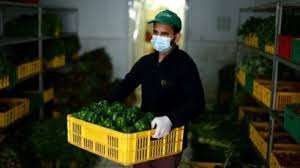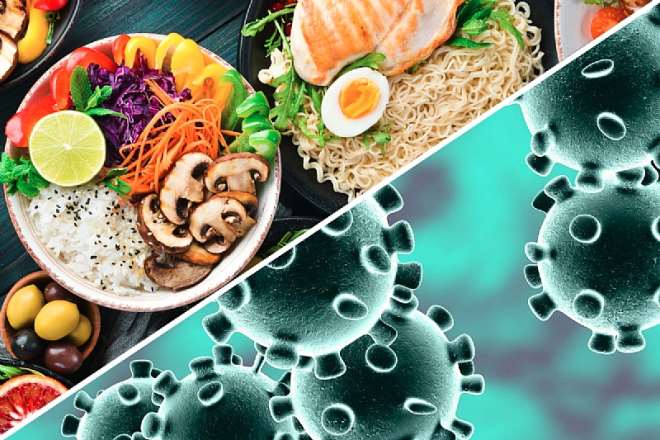
In Ghana, many keep asking and wondering, in this worrying time of COVID-19 ongoing pandemic, “Can I contract coronavirus through the consumption of food and/or water?’’
What is a virus?
A virus is a small parasite that lacks the capacity to thrive and reproduce outside of a host body.
What is coronavirus (covid-19)?
Coronaviruses are a family of viruses responsible for some respiratory diseases including common cold.
CAN COVID-19 BE PASSED ON THROUGH FOOD?
Currently, no reported or confirmed cases of COVID-19 have been linked to contamination of food and/or water.
“Experiences from previous outbreaks of related coronaviruses, such as severe acute respiratory syndrome coronavirus (SARS-CoV) and Middle East respiratory syndrome coronavirus (MERS-CoV), show that transmission through food consumption did not occur,” noted European Food Safety Authority’s chief scientist Marta Hugas.
The major risk of transmission is from close contact with infected people.
It is however highly recommended to consumers and food vendors to maintain good food and personal hygiene practices at all times.
This includes proper and regular hand washing, thorough cooking of food, such as meat, to destroy the virus.
Is handwashing important?
It is extremely important. Food handlers like yourself must wash hands:
- before cooking
- after coughing, sneezing or blowing nose
- before handling cooked or ready-to-eat food
- after handling or preparing raw food to avoid cross-contamination
- after handling waste
- after [domestic] cleaning duties
- after using the toilet/washroom
- after handling money
- Generally, wash hands thoroughly on regular basis.
If I wear gloves, is handwashing still important?
If using gloves, hand washing should be carried out before wearing gloves, between glove changes and after gloves are removed.
Is there a risk to consumers from 'open' food?
There is currently little scientific information about the survival of the COVID-19 (coronavirus) on the surface of open food. However, information on similar viruses shows that some food surfaces allow the virus to survive; others do not.
Therefore, it is important to maintain good hygiene practices around open food (e.g. unpackaged bread, cakes, fruits, vegetables, etc.) as this reduces the risk of contamination of the food.
Is there a risk associated with food packaging?
Food packaging is not known to present any specific risk to consumers. However, efforts should be made to ensure it is handled in line with usual food safety practices.
What is the advice when caring for a vulnerable person?
As older people, immunocompromised or ill people may be more vulnerable to food poisoning, you should follow proper food safety practices to ensure that the food you are providing is safe to eat.
Though no one is invulnerable, older adults appear to be at increased risk for severe illness or death from COVID-19. Underlying health conditions, including heart disease, lung disease, and diabetes, increase risk even further in those who are older. In addition, anyone with an underlying medical condition, regardless of their age, faces increased risk of serious illness.
Other precautionary measures
Frequent washing and sanitising of all food contact surfaces and utensils is advised.
Touch points such as door handles, fridge handles, keypads, etc. should be sanitised frequently.
Keep doors opened where possible to minimise contact.
Avoid handling ‘physical’ money and encourage the use of contactless payments e.g. mobile money
Let’s stay home. Let’s stay safe.
Resources: Ghana Health Service, Food Safety Authority of Ireland, Harvard University Health Publishing, Food navigator.com





 Tuesday’s downpour destroys ceiling of Circuit Court '8' in Accra
Tuesday’s downpour destroys ceiling of Circuit Court '8' in Accra
 SOEs shouldn't compromise on ethical standards, accountability – Akufo-Addo
SOEs shouldn't compromise on ethical standards, accountability – Akufo-Addo
 Father of 2-year-old boy attacked by dog appeals for financial support
Father of 2-year-old boy attacked by dog appeals for financial support
 Jubilee House National Security Operative allegedly swindles businessman over sa...
Jubilee House National Security Operative allegedly swindles businessman over sa...
 Nobody can order dumsor timetable except Energy Minister – Osafo-Maafo
Nobody can order dumsor timetable except Energy Minister – Osafo-Maafo
 Mahama wishes National Chief Imam as he clock 105 years today
Mahama wishes National Chief Imam as he clock 105 years today
 J.B.Danquah Adu’s murder trial: Case adjourned to April 29
J.B.Danquah Adu’s murder trial: Case adjourned to April 29
 High Court issues arrest warrant for former MASLOC Boss
High Court issues arrest warrant for former MASLOC Boss
 Align academic curriculum with industry needs — Stanbic Bank Ghana CEO advocates
Align academic curriculum with industry needs — Stanbic Bank Ghana CEO advocates
 Election 2024: We'll declare the results and let Ghanaians know we've won - Manh...
Election 2024: We'll declare the results and let Ghanaians know we've won - Manh...
